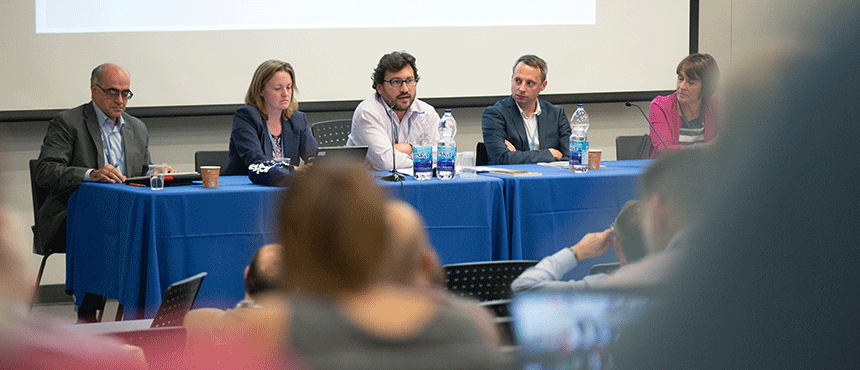Install this application on your home screen for quick and easy access when you’re on the go.
Just tap then “Add to Home Screen”

Donald Trump’s surprise victory in the U.S. presidential election, along with the unexpected approval of Brexit and resurgent far right movements in Europe, have brought to the fore pressing questions about the role of political science and how it relates to politics and policymaking. What is the future of academic freedom? What will the relationship between political scientists and government be, and how will that vary around the world? Will there be effects on collaboration among political scientists across the globe?
Should, and how should, these developments affect political science research agendas? How can political scientists best address questions of democracy, populism, and economic distribution? What is the discipline’s role in engaging policymakers and the public on these issues?
This Panel will address these questions, along with what these recent developments mean for political science, both in terms of the unique challenges that they introduce for political science research and their implications for future research agendas.
Date and time Thursday 7 September, 09:00-10:40
Location Eilert Sundts hus, ES AUD 7
Chair Steven Rathgeb Smith, American Political Science Association
Speakers
On 23 June 2016, 52% of the British electorate voted in favour of leaving the EU. In March 2017, Prime Minister Theresa May invoked Article 50 of the Treaty of the European Union, which started the formal procedure for withdrawal. What kind of Brexit will we have: hard or soft? How will the relations between Great Britain and the EU look after Britain has left? Who will suffer, and who will benefit from Brexit? Will Brexit be the beginning of the end of the European Union? Among others, these questions will be discussed.
Date and time Thursday 7 September, 11:00-12:40
Location Eilert Sundts hus, ES AUD 7
Chair Daniel Stockemer, Editor of EPS, University of Ottawa
Speakers
The welfare state environment is in the midst of transition, and is changing in ways that have significant implications for the nonprofit and social services sectors. Austerity and welfare retrenchment, increased competition among providers (including with for-profits), and more stringent evaluation and reporting requirements have affected the opportunities and challenges that service providers face. However, these changes, and their implications, differ across the wide variety of welfare states. This panel will address the changes in the welfare state environment and its effects on service providers in comparative perspective, focusing on common trends of austerity and competition while illuminating how different welfare states are dealing with these challenges.
Date and time Friday 8 September, 09:00-10:40
Location Eilert Sundts hus, ES AUD 7
Chair Steven Rathgeb Smith, American Political Science Association
Speakers
The European Research Council (ERC) was established in 2007 with the objectives of encouraging high quality research in Europe through competitive funding, and supporting investigator-driven frontier research across all fields, on the basis of scientific excellence alone. It complements other components of Horizon 2020. This Panel will discuss the following:
The Panel includes researchers who have studied and/or participated in the ERC funding activities, and commentators.
Date and time Friday 8 September, 14:00-15:40
Location Eilert Sundts hus, ES AUD 7
Chair Andreas Føllesdal
Discussants
Speakers
Date and time Saturday 9 September, 09:00-10:40
Location Eilert Sundts hus, ES AUD 7
Chair Karen Mossberger, Arizona State University
Discussants
Speakers
The whirlwind of changes taking place in the international community reminds us of the importance of staying mindful, alert and committed to the fundamental values that the global academic community holds dear. These values include academic freedom and human rights protection, which belong to the large rubric of democracy.
While the election results of France and the Netherlands reassure us of the majority will to curb rising nationalism, we cannot put our anxiety to a rest. The anxiety reflects the global shockwave originating from the Brexit vote and from Donald Trump's electoral victory.
In this shifting milieu we have been witnessing the visible erosion of democratic norms in various parts of the world. We are thus increasingly concerned about the grave consequences of the precarious political upheavals for academia.
Where are we headed? What can be done? Where to draw the line between academic research and political activism? How to address the controversial topics pertaining to academic freedom (ex. freedom of speech, etc.) and human rights violations (ex. defamation, etc.)? How to negotiate between normative ideals and reality of academic survival?
This Panel is devoted to the disuccsion of academic freedom, and aims to address the following questions:
Date and time Saturday 9 September, 11:00-12:40
Location Eilert Sundts hus, ES AUD 7
Chair Mikyoung Kim, Emory University
Speakers